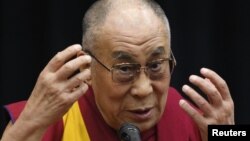BEIJING —
China has issued an angry reaction to news that President Obama will meet with the Tibetan spiritual leader Friday at the White House,warning there will be consequences for the U.S. if the meeting is not canceled.
Foreign Ministry spokeswoman Hua Chunying said the meeting is a "crude interference" with China’s internal affairs, adding that any foreign country that meets with the Dalai Lama will find its own interests hurt in the end.
Obama has met with the Dalai Lama twice before, in 2010 and 2011. China issued similar angry responses to those meetings. Friday’s meeting will take place in the White House Map Room, not in the Oval Office.
The Dalai Lama’s visit to the U.S. comes amid rising tensions between China and the U.S. over territorial disputes in the East and South China Seas. Obama has announced a rebalancing of U.S. foreign policy and military focus to Asia, which some see as a response to China’s growing power in the region.
Despite China’s warnings, Free Tibet spokesperson Alistair Currie says Obama’s meeting with the Dalai Lama is unlikely to have a negative longterm impact on U.S. China relations.
“So it does seem that China makes a lot of bluster about this, and it’s attempting to bully world leaders to say, this is our importance. But of course China is dependent on trade with the rest of the world. It can only bluff so much,” said Currie.
Since February 2009 more than 126 people have self-immolated in Tibetan areas of China in protest of Chinese government policies.
The Sichuan provincial government recently issued new regulations that punish families, communities and Buddhist temples of those that self-immolate. The provisions include seizure of land and assets. China has called protesters who self-immolate terrorists.
China has also blamed violence in Xinjiang Province, home to China’s Muslim Uighur minority, on religious extremists and separatists. More than 100 people have died in violent protests in Xinjiang over the last year.
Foreign Ministry spokeswoman Hua Chunying said the meeting is a "crude interference" with China’s internal affairs, adding that any foreign country that meets with the Dalai Lama will find its own interests hurt in the end.
Obama has met with the Dalai Lama twice before, in 2010 and 2011. China issued similar angry responses to those meetings. Friday’s meeting will take place in the White House Map Room, not in the Oval Office.
The Dalai Lama’s visit to the U.S. comes amid rising tensions between China and the U.S. over territorial disputes in the East and South China Seas. Obama has announced a rebalancing of U.S. foreign policy and military focus to Asia, which some see as a response to China’s growing power in the region.
Despite China’s warnings, Free Tibet spokesperson Alistair Currie says Obama’s meeting with the Dalai Lama is unlikely to have a negative longterm impact on U.S. China relations.
“So it does seem that China makes a lot of bluster about this, and it’s attempting to bully world leaders to say, this is our importance. But of course China is dependent on trade with the rest of the world. It can only bluff so much,” said Currie.
Since February 2009 more than 126 people have self-immolated in Tibetan areas of China in protest of Chinese government policies.
The Sichuan provincial government recently issued new regulations that punish families, communities and Buddhist temples of those that self-immolate. The provisions include seizure of land and assets. China has called protesters who self-immolate terrorists.
China has also blamed violence in Xinjiang Province, home to China’s Muslim Uighur minority, on religious extremists and separatists. More than 100 people have died in violent protests in Xinjiang over the last year.




